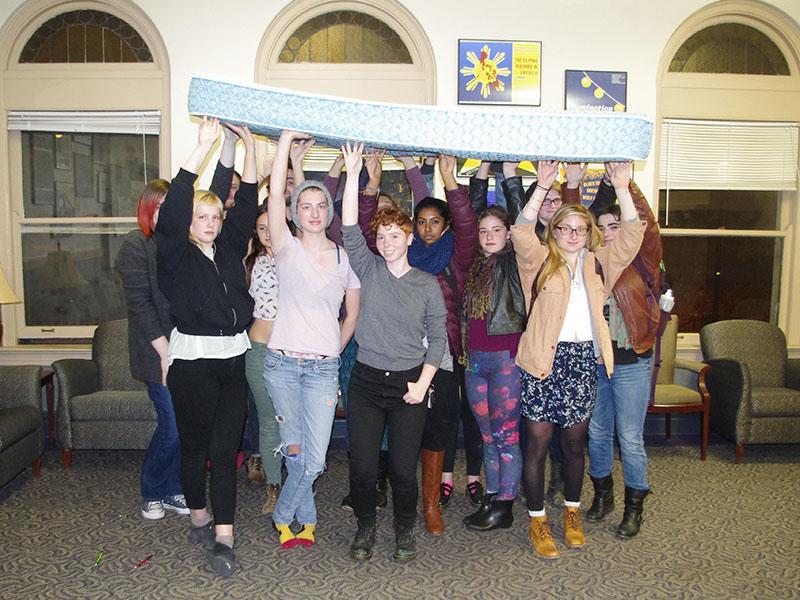Obies ‘Carry That Weight’ on Day of Action
College senior Sophie Meade (left), College juniors Karalyn Grimes and Laura Shriver and others lift a mattress to show their solidarity with survivors of sexual and domestic violence. In line with the national Carry That Weight Day of Action, several students and faculty members carried mattresses, blankets and pillows around campus as a visual demonstration of the burden of being a survivor of sexualized violence.
October 31, 2014
Trigger warning: This article contains discussion of sexualized and domestic violence.
Armed with mattresses, pillows and blankets, several students and faculty members visualized the burden of sexualized violence this past Wednesday and showed their solidarity for survivors by carrying — and sometimes dragging — their bed-related items around campus.
The widespread visualization was part of the Carry That Weight Day of Action, a national event in which students, staff and faculty at colleges across the country showed their solidarity with survivors of sexual and domestic violence.
The national Day of Action was inspired by the activism of Columbia University student Emma Sulkowicz, who reported her rape to her school’s administration in April 2013, only to find that the administration found the male student she reported “not responsible.”
To demonstrate her anger toward the administration and their alleged gross mishandling of the process, Sulkowicz carries her mattress with her everywhere she goes and plans on continuing to do so as long as her rapist is still enrolled at Columbia. The visual demonstration is meant to be a tangible expression of the burden of being a survivor of sexualized violence.
“Regardless of your survivorship status, [carrying the weight] is a show of solidarity and an attempt to increase awareness of sexualized violence on college campuses and the ways in which they overlap with systems of oppression and are ignored,” said College junior Laura Shriver, who participated in wednesday’s demonstration.
The term “survivorship status” refers to the fact that not everyone who has suffered from sexualized or domesticated violence feels the “survivor” label appropriate. Some might classify themselves as victims, as victors, or any other number of terms, including those completely devoid of labels. It also refers to the fact that some students involved in the demonstration were allies in solidarity.
In line with the national Day of Action, Shriver and her fellow student activists organized two community meetings that centered on the needs and actions of students who have been subjected to sexualized and/ or domesticated violence, regardless of their survivorship status.
During the meetings, victims, survivors, allies and others, gathered in attempt to affirm the truths of those who have experienced sexualized and domestic violence, as well as to discuss how to obtain a more effective support system on campus. While many attendees expressed that the event helped them heal, they also used the space to question the efficacy of the available resources on campus.
“We don’t have public spaces to honor the experiences of survivors, and in order for survivors to heal … they need their communities to recognize them, to be accountable and to come together in a public space and acknowledge their trauma,” said College senior and discussion facilitator Sophie Meade.
Many of the students who attended the discussions also noted the lack of public safe spaces, something that is not addressed in the school’s updated Sexual Misconduct Policy, a 64-page document that was passed last spring.
“The Sexual Offense Policy taskforce, in the spring, worked really hard to create this new Sexual Misconduct Policy … that is being implemented this year,” said Karalyn Grimes, College junior, discussion facilitator and OSCA sexual offense policy advocate. “In other words, it’s a great policy, not perfect though, and it has a ways to go.”
Changes in the new policy include a revised definition of consent and a broadened scope of actions that fall under the category of sexual misconduct. The administration is now beginning to implement these changes.
“In the next week or two, there will be an open meeting to share information about the new policy and processes in greater detail with the campus community,” Title IX Coordinator Meredith Raimondo said in an email to the Review.
In addition to the new sexual misconduct policy, all first-years will be required to take prevention and awareness programs as a part of the Campus Sexual Violence Elimination Act of 2013, which mandates education programs for all incoming students. The Campus SaVE Act attempts to increase transparency on campuses, requiring all schools to disclose incidents of assault, stalking and harassment.
“The Oberlin administration has made a lot of changes in the past year in the way that they respond to sexual misconduct, and a lot of those changes have been made in staffing and in changing job descriptions of the people involved,” Meade said.
Though the facilitators of the Oberlin Community Gathering for Survivor Support agree that the campus needs to implement more safe spaces, Grimes spoke optimistically of students involved.
“I do think Obies are willing to engage with these issues and, as a SOPA, I hear a lot of folks wanting and desiring more from each other — wanting to be more honest and more supportive of one another,” Grimes said.


























